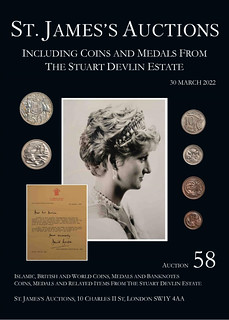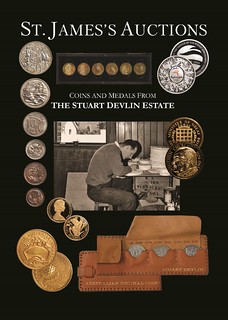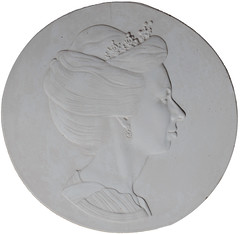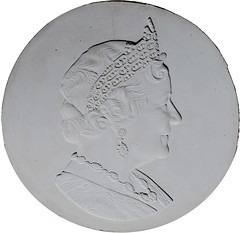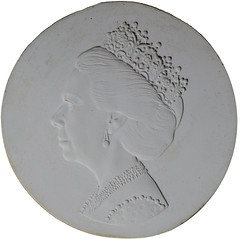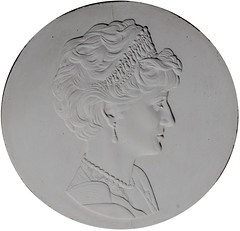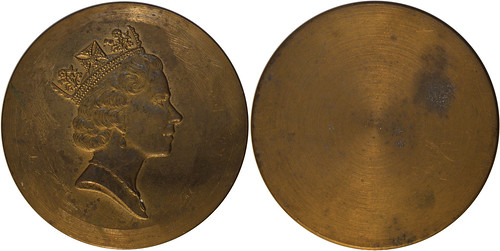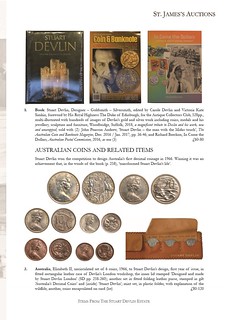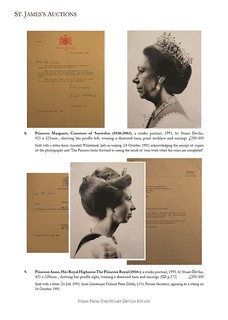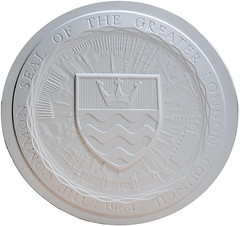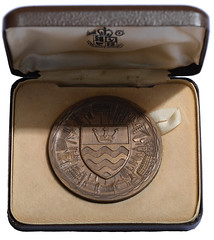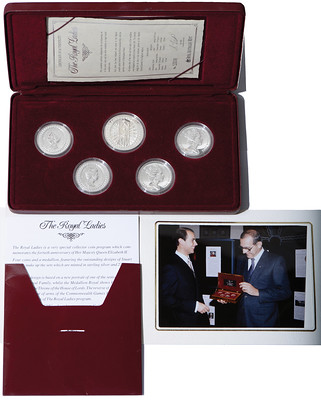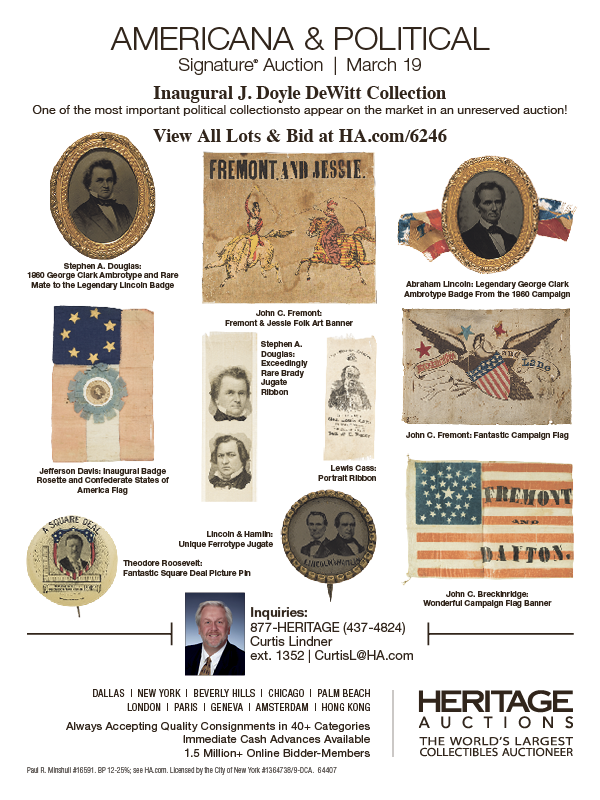
PREV ARTICLE
NEXT ARTICLE
FULL ISSUE
PREV FULL ISSUE
V25 2022 INDEX E-SYLUM ARCHIVE ST. JAMES OFFERS STUART DEVLIN ITEMSSt. James Auctions is offering items from the studio of coin and medal designer Stuart Devlin. Here's the press release. -Editor NUMISMATIC ITEMS FROM THE STUDIO OF STUART DEVLIN
The Australian-born Stuart Devlin (1931–2018) was, in the words of the late HRH Prince Philip, In 1991 he was commissioned to design the portrait reverses of a set of five coins for the Australian Mint to mark the 40th anniversary of the accession of HM Queen Elizabeth II the following year. It was to be called Masterpieces in Silver – The Royal Ladies. The auction will include five of his hand-carved portrait plasters of the Queen Mother, Princess Margaret, Princess Anne, Princess Diana and the Duchess of York. The excellent portraits are worked from portrait photographs by Stuart Devlin also in the sale. They were taken at very short notice at Buckingham Palace just prior to the State Banquet for President Mubarak of Egypt on July 23rd 1991. He had wanted to show them all wearing tiaras so he was granted the special time when not only were the ‘Royal Ladies' all present but all wearing their finest! Other original plasters in the sale include a 1966 posthumous portrait of Winston Churchill (for a set of medals of British Prime Ministers); the Common Seal of the Greater London Council, 1964 and the lionfish reverse for the 1967 fifty-cent coin for Singapore's first decimal coinage. Here's an excerpt from the catalogue's Foreword. -Editor St. James's Auctions is pleased to offer items from the Studio of Stuart Devlin in our March sale 2022. The collection comprises of a good number of Australian coins which he designed alongside a group from The Royal Ladies Collection, commissioned in 1992. Here we offer the portrait photographs taken by Devlin of the Royal Ladies (The Queen Mother, Princess Margaret, Princess Anne and Diana), as well as the plaster casts which Devlin produced from these images, and finally we offer the resulting coins (lots 7 – 12). Following the Australian coins, we offer a group of British coins from Devlin's personal collection, as well as further plaster casts which he used to create coins, and the resulting coins themselves. Particular highlights include a superb set ‘Great British Prime Ministers' comprised of six 22ct. gold medals designed by Stuart Devlin of the six prime minters between 1676 and 1965 (Walpole, Pitt the Elder, Pitt the Younger, Disraeli, Gladstone, Churchill) (lot 30), and the plaster casts which Devlin used to create some of his iconic deigns, including the plaster used for Churchill's portrait in the previous lot (lot 29) and the one used for the Common Seal of the Greater London Council (lot 31). Devlin also amassed a collection of world items including another plaster, this one used for the Republic of Singapore's fifty cent reverse featuring the lionfish (lot 46). Here's a biography from the catalogue, written by John Andrew. -Editor Born in 1931, at the tender age of 13 Devlin's aim was to become an art teacher specialising in metalwork. This was achieved age 21 at Wangaratta Technical School, which he regarded as being ‘banished to the bush'. In 1956 Devlin moved to Melbourne and started teaching at Prahran Technical Art School. He combined his lecturing with part-time study at the Royal Melbourne Technical College. Within one year he gained a diploma of art in gold and silversmithing, normally a three-year full-time course, with the highest marks ever awarded. This accomplishment resulted in a two-year travelling scholarship. He persuaded London's Royal College of Art (RCA) to let him undertake its silversmithing course in two as opposed to three years. At the RCA from 1958 to 1960, he left with two degrees, one in silversmithing, the other in industrial design. Devlin's success at the RCA resulted in his being awarded a Harkness fellowship. He chose Colombia University in New York as his base. Initially he pursued silversmithing, but then turned his attention to sculpture, which resulted in a one-man show at the Thibaut Gallery in Madison Avenue, New York. A condition of Devlin's travelling scholarship was that afterwards he should complete his teaching contract in Australia. He returned in 1963 and was appointed inspector of art schools for the state of Victoria. However, he detested the role as he realised that as a teacher he could put his ideas immediately into action, but as an inspector it would take years. He resigned after three months and began lecturing at Melbourne University. The highly respected Joe Burke, professor of fine art at Melbourne asked Devlin if he would be interested in joining a group of well-known designers to compete for the creation of Australia's decimal coinage. He nearly declined as he considered designing coinage was a graphic design matter and he was a sculptor, but he felt he had nothing to lose, particularly as the government paid participants a handsome sum. The group met monthly with the Treasury officials. Their patrons as well as their peers reviewed each participant's designs. Initially the much older and more experienced participants slated Devlin's work, which featured aspects of Australia's industry. This was a depressing experience for Devlin until a rapport developed and it was realised that members of the group were helping each other. His final designs, which featured Australia's fauna, won. They broke new ground as the designs were an integral part of the flans (the surfaces of the coins) as opposed to images placed on the flans. With the exception of the one and two cent pieces, which were withdrawn in 1992 because of their lack of purchasing power, they remained in circulation at Devlin's death. Devlin went on to design coins for some thirty countries. However, this was not his main career. While supervising the cutting of the dies for the coinage at London's Royal Mint, in 1964, with his £8,000 competition winnings, he purchased a small house in Clerkenwell and established a workshop in the basement. At the time his only commission was for the mace for the University of Melbourne. However, the business soon began to gain momentum and he had to recruit craftsmen and establish workshops to meet the demand. He was pivotal in the Renaissance of British silver post World War II. His bringing ‘out of the box' creativity to silversmithing infl uenced generations of British smiths to be innovative.
To read the complete catalog, see:
Wayne Homren, Editor The Numismatic Bibliomania Society is a non-profit organization promoting numismatic literature. See our web site at coinbooks.org. To submit items for publication in The E-Sylum, write to the Editor at this address: whomren@gmail.com To subscribe go to: https://my.binhost.com/lists/listinfo/esylum All Rights Reserved. NBS Home Page Contact the NBS webmaster 
|
